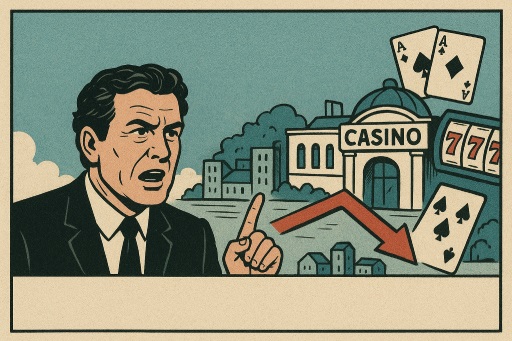France's Casino Industry Rejects Plans to Legalize Online Gambling

Casinos de France, the organization representing the country’s 203 land-based casinos, has firmly opposed government discussions about legalizing online casinos. The association argues that such reforms could inflict severe damage on the national economy, local communities, and public health, with estimated losses surpassing €500 million annually.
The debate over reforming France’s gambling laws has intensified as authorities face growing pressure to address unlicensed operators. Currently, the country permits online sports betting, horse racing, and poker, but casino-style games remain outlawed. According to Casinos de France, expanding to online casinos would not only drain tax revenues but also destabilize thousands of jobs tied to physical venues.
Casinos Decry “False” Claims About Illegal Market
In its Wednesday statement, the trade body estimated that legalizing online casinos could result in a net annual loss of €546 million for public finances after accounting for indirect health and employment-related costs.
Grégory Rabuel, president of Casinos de France and CEO of Barrière Group, criticized the French online gambling association AFJEL’s assertion that €1.2 billion is being lost to unregulated operators. “It’s a hoax, and worse, it’s a loss for the state,” he said. “Destruction of local jobs, reduction of municipal budgets, the withering away of cultural life in towns and villages. I’m not even mentioning the impact on the mental health of the French, which would amount to hundreds of millions in additional costs for social security.”
The organization emphasized that introducing a legal iCasino market could force closures of established venues, erode municipal revenues, and weaken the fabric of small-town economies. Casinos de France maintains that the risks far outweigh any potential benefits.
Threats to Local Revenues and Employment
France’s casino network employs more than 31,000 people and contributes roughly €1.6 billion per year in taxes and social security, with more than €600 million flowing to local governments. The trade body fears that an online expansion would divert spending away from land-based casinos, leading to significant revenue declines for both the state and municipalities.
Casinos de France also pointed to examples abroad where similar regulatory moves led to unexpected consequences. In Sweden, physical casinos reportedly shut down after online legalization, while unlicensed gambling continued to flourish—accounting for about 40% of bets. Switzerland, meanwhile, continues to battle unauthorized “mirror sites” that bypass national restrictions.
“Everywhere, the promise of new revenue has turned into a net loss for local communities: decreased economic activity, job losses, a surge in risky behaviour and the persistence of a thriving black market,” Casinos de France stated.
Casinos Champion Responsible, Community-Based Gambling
The association insists that traditional casinos represent a more controlled and socially responsible model of gambling. These venues operate under strict supervision, ensuring players are verified, minors are excluded, and signs of risky behaviour are promptly addressed.
“Supervision is real, immediate and humane. Casinos directly ensure addiction prevention and support concrete responsible gaming programmes. They are places of community and social connection, where gambling is never an incentive but a controlled, monitored activity, integrated into the local economy,” the group explained.
Casinos de France concluded that the country’s network of land-based establishments not only upholds responsible gambling standards but also safeguards jobs, public health, and municipal funding. The organization called on policymakers to preserve this balanced model rather than opening the door to online casinos that, in their view, could destabilize France’s gambling landscape.
Source:
France’s Land-Based Casinos Resist Online Gambling Legalization, LCB.org, November 8, 2025.








